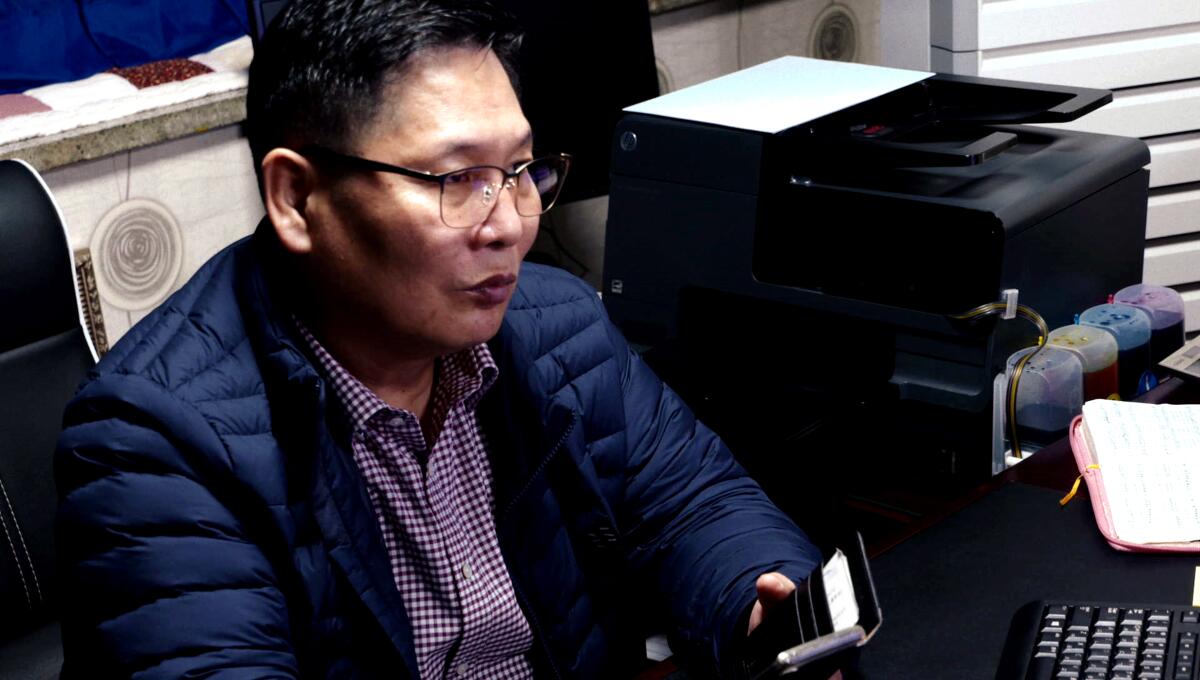“Beyond Utopia,” an eye-opening thriller that captures a family’s desperate and dangerous escape from North Korea, is one of the year’s most acclaimed documentaries, winning an audience prize after its January premiere at the Sundance Film Festival, and recently earning a spot among the 15 shortlisted titles for consideration in the documentary feature Oscar race. Yet, at the beginning, it was a hard sell to its director, Madeleine Gavin.
“My initial feeling was one of great hesitation,” the New York-based filmmaker said. “I didn’t understand why I would be the right person to do this. I said to them, ‘Wouldn’t you want to talk to Korean directors or somebody who has more of a connection to the subject?’” But her producers — Rachel Cohen, Jana Edelbaum and Sue Mi Terry — with whom she had worked previously as an editor, persisted.
“They gave me a huge amount of latitude,” recalled Gavin, whose 2016 film “City of Joy” focused on a women’s refugee center in eastern Democratic Republic of Congo. She took her time exploring the subject and source materials. Those included the 2015 memoir “The Girl With Seven Names,” by Hyeonseo Lee, a North Korean defector and activist who appears in the film, which provided an early impetus for the production.
Digging deep into the internet, “almost into the dark web,” Gavin discovered a secret world of hidden camera footage that made graphic the harsh realities of life under the totalitarian regime of Kim Jong Un. “North Koreans themselves have been shooting [this] since the ‘90s, with flip phones,” she said. “Really risking their lives, risking their families’ lives to get the truth of their country out. They’re shooting literally out of holes in paper bags, out of their pockets and sleeves.” The filmmaker recognized a vast disparity between what she saw “and the absence of North Korean people in our media and in our world.”
That’s when she knew. “This film had to be made, and there was no one making it,” she said. “Beyond Utopia” leans into the ragged aesthetic of this guerrilla-style found footage, deftly reassembled by the filmmaker (who also acted as editor) to not only show why North Korean defectors would risk death to escape the country but also how they manage their getaways: utilizing an “underground railroad” of brokers and safe houses to navigate a grueling trek through China and multiple Southeast Asian countries to reach South Korea. “I wanted to do something that was as experiential as possible,” said Gavin, who pointedly avoided one of the most common nonfiction workarounds, the re-creation.

South Korean pastor Seungeun Kim and his Caleb Mission has, since 2000, guided more than 1,000 defectors out of North Korea.
(Roadside Attractions)
Her key was a South Korean pastor named Seungeun Kim, whose Caleb Mission has, since 2000, guided more than 1,000 defectors out of North Korea. Pastor Kim’s mission acts as the heart of the film, and also its pivot, as Gavin tracks two different defection attempts engineered through a multinational network. One is the five-member Roh family, whose number complicates the transit. The other is the teenage son of a successful defector named Soyeon Lee, who longs to reunite with her child.
Both endeavors are tense and torturous, with dramatically opposite outcomes.
Even if someone makes it across the Yalu River, which borders China across 800 miles and is overseen by ramped-up North Korean security forces with “shoot to kill” orders, the risks are intense and forbidding. If caught by Chinese officials, a defector will be returned to North Korea and face torture and imprisonment, possibly death. Brokers, paid to safeguard the defectors but typically with no higher motivation, might instead consign them to the organ trade or sell them to sex traffickers.
Remarkably, Kim himself meets the defectors en route, although he can no longer enter China. “He was warned in 2009 that he could be kidnapped into North Korea,” Gavin said. In the film, Kim confides that although he looks fine on the outside, his body is a wreck from all the injuries he’s sustained. “He prepares himself for death every time he does one of these escapes,” Gavin said. “He always tells himself, this is going to be the last one, and then he finds himself doing it again. He’s in constant pain … and he’s in a lot of fear.” Yet there he is with the Roh family, including two children, and their elderly grandmother, making a rugged marathon trek through a jungle in Thailand.
“The journey through the jungle is so physically and mentally difficult that it is hard to describe in words,” Kim said, via email, citing his faith in God to help him overcome fear. “While I am in the jungle, I try to focus on the freedom that North Korean defectors will find at the end of their journey. That’s how I get through the experience.”

